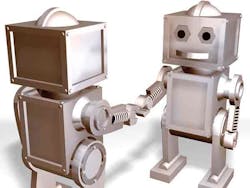In India , there is plenty of evidence that Gates’ observations are on the mark. Indian’s Prime Minister Manmohan Singh recently announced a new initiative in robotics. And the country’s top government scientists are at work on robot and artificial intelligence (AI) technologies for use in everything from border patrols to the fielding of “robot armies” to replace human soldiers in future wars. The Indian Space Research Council is also planning to send a robot to the moon to bring back samples.From cars to leatherWith the boom in the manufacturing sector, the robotics industry is gearing up forsharp growth in the non-governmental private sector too. At India ’s biggest auto manufacturer, Tata Motors, the employee strength has come down by 20 percent, while the company’s turnover has increased 2 1/2 times. Its Pune plant alone has invested in 100 robots, and the automaker is adding more.Another Tata Group company, Tata Leather, has metamorphosed from a world-class tannery-focused operation to a global supply chain operator. It is a business that takes research and development very seriously. “We’re looking at R&D as a profit center in its own right,” says Rajiv Bhirud, head of research and development. With robots being used for material handling, it is at the forefront of automation in the leather industry.Sale of industrial robots is gathering pace in India as automobile companies expand their operations in the country. ABB has sold about 300 robots in India in the last seven years. But the Zurich-based vendor expects double-digit growth in India from now on because of the rapid expansion of automobile companies.This has also prompted ABB—one of the top three global manufacturers of robots—to consider setting up a manufacturing center in the country. “We are open to manufacturing robots in India , as it is a fast growing business here,” says ABB Executive Vice-President and Robotics Division Head Anders Jonsson. India already supplies peripherals for making ABB robots, apart from doing application engineering for them. Jonsson said ABB had doubled its employees’ strength in India and had set up demonstration centers in Pune, Bangalore and Chennai and service centers in about eight cities.Beyond labor savings“Maturity for using robots is growing extremely fast in India ,” Jonsson says, adding that robots do not replace jobs, as claimed by their critics. “Customers in India are beginning to understand the usefulness of robots, as they not only save costs, but are also a safer and a healthier option,” he says. For private companies, robotics is not just about saving labor. The technology also helps companies significantly step up productivity and quality, to meet the demands of international competition. That it saves costs is a significant bonus, say industry analysts.With a cost advantage, owing to lower engineering costs in India , the country can produce more robots—domestic supplier Precision Automation & Robotics (PARI) is already pitching its robots to large organizations in the United States and Europe .In an effort to develop robotics and automation that could end the almost complete dependence on imports of robotic arms in industrial manufacturing, young Indian scientists have developed a ‘pick and place robot (PP robot) as part of the “Home Grown Technology Program,” on the initiative of Technology Information, Forecasting and Assessment Council (TIFAC), under the Department of Science and Technology (DST).New from Tech-India?With its animation industry starting to make an impact in Hollywood and its software industry already well-known around the world, automation and robotics could be the hot new field for Tech-India. “The capability to built sophisticated robots is already in the country,” says Dr Jagannath Raju, director of Bangalore-based Systemantics India , which manufactures the PP robot. “But the initiative has to be moved into the private sector [to be able to replace all imported machines],” he adds.
Leaders relevant to this article:

